We may not have the course you’re looking for. If you enquire or give us a call on 01344203999 and speak to our training experts, we may still be able to help with your training requirements.
Training Outcomes Within Your Budget!
We ensure quality, budget-alignment, and timely delivery by our expert instructors.
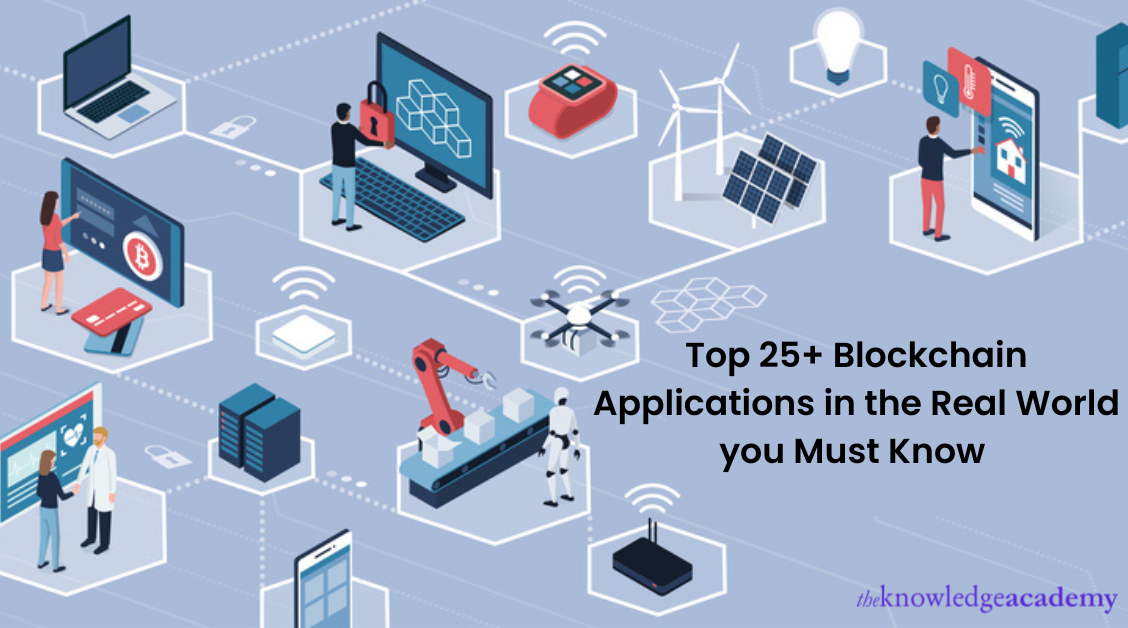
No matter which industry you are related to, implementing Blockchain into your business will enhance the security and integrity of the industry. Blockchain Applications can unlock competitive advantages to scale up your business. Many industries have already realised the importance of implementing Blockchain services in their ecosystem to discover new potential business opportunities. It can help you effectively collaborate and avail customers confidence in your services.
There is a vast scope for Blockchain innovators as they can transform businesses worldwide. According to Statista, the market value of Blockchain technology has been estimated to be at 4.92 billion GBP in 2021. If you too wish to capitalise on this innovative technology, this blog might be just what you need. Discover all the various Blockchain technology applications in every field of life and learn in-depth about Blockchain Applications.
Table of Contents
1) Understanding Blockchain technology
2) Blockchain Applications in Government
3) Blockchain Applications in Business
4) Blockchain Use Cases in Banking & Finance
5) Blockchain Applications in other Industries
6) Conclusion
Understanding Blockchain technology
Blockchain is a shared database or ledger used to facilitate transactions, record the process, and track both tangible and intangible assets in businesses. The Blockchain’s immutable ledger can be only used and accessed by its permitted members. Blockchain technology has built vast trust among its users due to its transparency, enhanced security, and instant traceability.
Blockchain Applications in Government
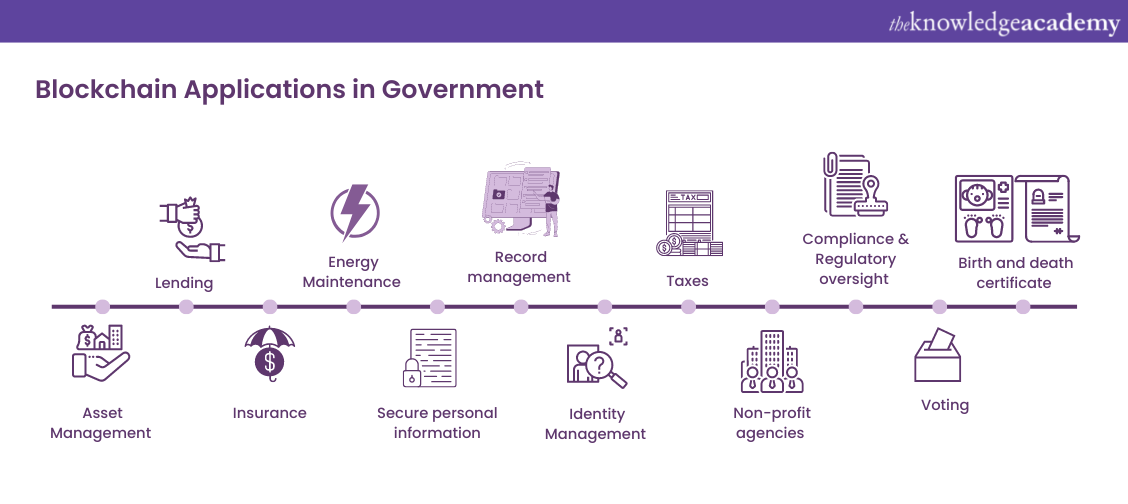
Applying Blockchain technology in Government offices can reduce fraud and maintain work transparency while lowering operational costs. Digital disbursement can also help the recipient receive the funds quickly. Blockchain also makes it possible to implement regulatory compliances due to its transparency alongside optimising time and cost. Let’s see some such benefits of Blockchain technology in Government bodies.
Asset Management
Asset Management benefits from Blockchain technology similar to any other financial field. Asset Management generally includes the possession and trade of different assets owned by an individual. These assets may be real estate, mutual funds, fixed income and alternative investments.
The traditional means for trading assets often induces a high cost, as such trades involve cross-border payments across different nations. Blockchain technology simplifies this by removing the middleman from such processes, such as brokers and Settlement Managers. Blockchain provides a direct and transparent platform alternative, reducing the extra cost and potential errors.
Lending
Blockchain technology allows for creation of automated trigger which can generate payments and make loan processing significantly faster. Blockchain also allows you to create Smart Contracts, which collateralises loans for you.
Insurance
Using Smart Contracts with Blockchain can provide transparency and settle claims for customers. This reduces the amount of necessary paper work and reconciliation required from the insurance provider, reducing time taken.
Energy Maintenance
PwC global power & utilities believes that Blockchain technology can play a part in forming a more coherent system and process in energy maintenance. Some such processes might include providing a guarantee of origins, ownership documentation, emission control and certification for renewable energy. Additionally, Blockchain technology can be integrated in energy supply transactions, with added benefits of clearing, metering and billing energy process, being recorded.
Secure personal information
Application of Blockchain technology can secure access to confidential information (such as date of birth, social security number and more), which is helpful, especially in the healthcare, travel, financial, and education industries. This is possible thanks to Blockchain, which allows only permitted members to access the data within a block.
Record management
Maintaining a large amount of data traditionally took a lot of work for government bodies. These data usually include records such as birthdates of individuals, date of death, property transfer and marital status of individuals within the governing body.
These records are often done manually on paper, making maintaining and documenting them hard. These manual records are susceptible to destruction and extremely difficult to store due to the physical space they take. These documentations require the physical presence of an individual to make any necessary changes to them in times of need. This makes the process extremely hectic and time-consuming.
This can be changed by implementing Blockchain technology, where data and an individual's records can be stored in a dedicated data block. Any changes made within a blog can thus be traced with the chain of data blocks, making record-keeping very efficient.
Identity Management
Blockchain advocators strongly believe that a robust Blockchain can make identity verification process much more efficient. The Blockchain can use the minimum provided data and tally it with its stored data record. This will allow you to identify an individual much faster compared to traditional identity verification methods.
Taxes
Blockchain technology integration can reduce the potential of human error in taxes, thus increasing its documentation efficiency. Traditional method of filing taxes can be hectic and liable to occasional mistakes, but Blockchain can help change this. The digital and decentralised nature of Blockchain allows tax administration to be transparent. This means the state of the tax & parties handling it, can be verified on each instance of process.
Blockchain technology also allows different governing bodies to share the records of an individual's taxes with each other. This reduces the potential for tax evasion and record alteration, as the history of taxes can be viewed and verified at all times.
Non-profit agencies
A Non-Profit agency’s greatest challenge is often gaining the public trust. An honest non-Profit agency with good intentions can still be subjected to distrust by the general public. For an agency that relies on public funding and faith, this can be a real problem.
This problem can be solved with Blockchain technology integration, allowing Non-profit organisations to display the state and usage of the funds. This helps the agencies in building trust in public. Additionally, this lets them manage their funds better, by tracing their state and usage over course of time.
Compliance & Regulatory oversight
Compliance with policies implemented by governing bodies and its regulation plays a strong part in the successful functioning of enterprises. Many companies are expected to abide by such compliances to avoid large fines. Unfortunately, the errors such as oversight on an individual’s part is bound to cause the failure of compliance.
Presence of such human errors, causes a domino effect, leading to a chain of consequences. These consequences might be degradation of customer safety standards, putting customers at risk and heavy fines. Blockchain simplifies this by making updated records accessible to compliance regulators in real-time. This makes it easy to root out any potential for error in the early stages and avoid them in future.
Voting
The running cost for an election can be significantly reduced by implementing Blockchain technology in the voting process. This would allow Blockchain to secure your identity and help you vote comfortably just by using a smartphone and the internet, thus resulting in an increased reach and accessibility.
Additionally, Blockchain integration also ensures that the accessibility to voting process is strictly limited to eligible voter by verifying each of them. Additionally, Blockchain makes it impossible for any data to exist in same state twice, making sure no individual can vote twice. Lastly it helps you avoid any data tampering with the voting results.
Birth and death certificate
Traditional methods of documenting birth and death certification have chances of documentation error and storage issues. This has been a long-lasting problem globally, evident by a report from UNICEF. This report claims that one-third of all the children younger than five years of age lack a birth certificate.
Blockchain technology can simplify the process of documenting certificates and their management. Blockchain can achieve this by creating a virtual depository storage for birthdates and death certificates. Thanks to the core nature of Blockchain, these certificates will only be accessible by authorised individuals, making them extremely secure.
Learn the fundamentals of Blockchain and Ethereum. Sign up for Ethereum Developer Training now!
Blockchain Applications in Business
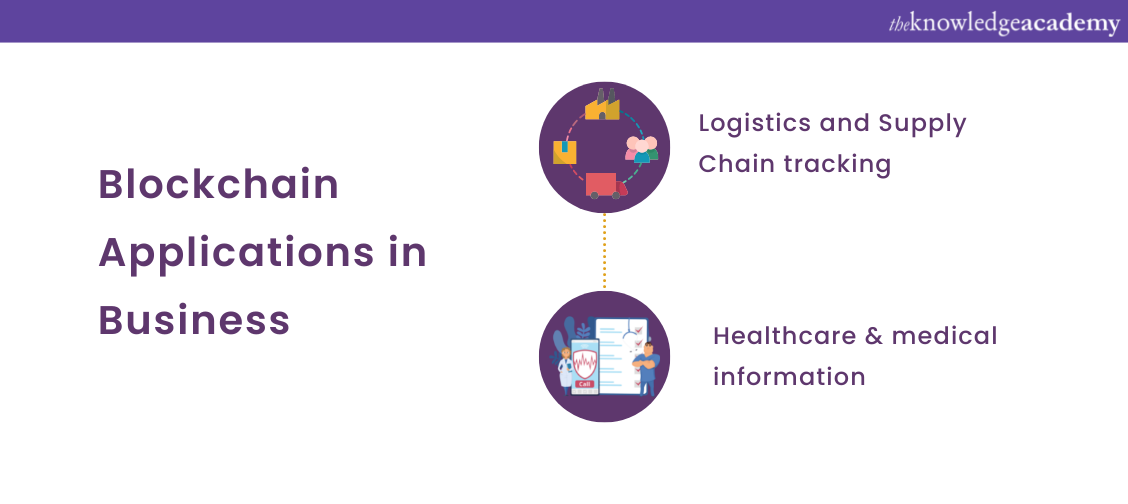
Business practices commonly involve transactions between different parties. These transactions can be made much more efficient with Blockchain’s distributed ledger technology. This will allow different individuals involved in a transaction to view an information at same time, improving the overall business efficiency.
Logistics and Supply Chain tracking
Blockchain can aid you in tracking your Supply Chain network or logistics, as Blockchain’s data cannot be altered. This provides you with greater integrity and credibility, as the data is available in the public ledger. This leads to better communication between business partners and real-time data with increased accuracy.
Healthcare & medical
Information Implementing Blockchain technology in the healthcare industry has proved to be a great application, delivering some promising results. It has helped in cost reduction and retrieving patient’s medical data, thus providing accurate and immediate care to them.
The health professionals, patients, or their family members can keep track of the medical data to check the improvements and manage the information with multi-care facilities. Blockchain helps doctors and patients to communicate effectively. It assists them with a steady pipeline by maintaining records, appointments, and medical history to diagnose and supplement constant medical needs.
Preparing for a Job Interview? Check out our Blockchain Interview Questions!
Blockchain application in Banking & Finance
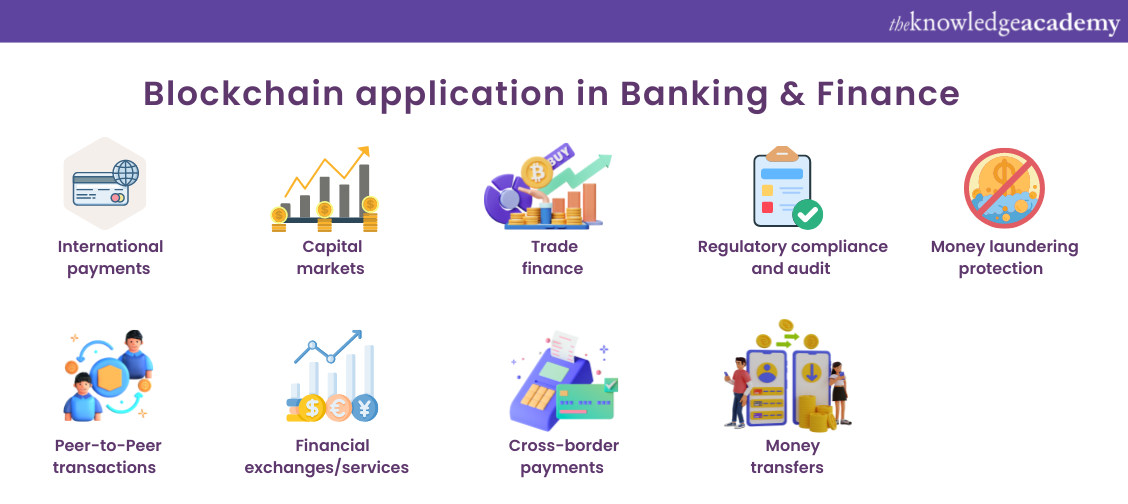
Banking services can be streamlined and simplified with the help of Blockchain technology. The usage of Blockchain will reduce counterparty-based risks and allow “Know Your Customer” (KYC) document authentication. This will allow for many benefits such as real-time verification of documents. Let's look at few more Blockchain applications in Banking and Finances.
International payments
Blockchain creates an excellent means for international payments by creating a secure and alteration-proof activity log. An instance of this can be found in the year 2018 with the world’s first-ever Blockchain technology-based money transfer service. Santander One Pay FX service, launched by Banco Santander, allowed same-day international money transfer by using Ripple’s “xCurrent” software.
Santander reduced the number of intermediaries required for international payment, raising the transaction’s efficiency. The Santander commercial bank had a large number of retail clients who benefited greatly from the cheaper payment in international transfers.
Capital markets
Capital markets have the potential to improve significantly with the help of Blockchain technology. Blockchain allows it to Integrate audit trails, improve operations and efficient settlement and clearing.
There are Blockchain solutions specifically built for improving the capital market, such asAxoni, founded in the year 2013. Axoni announced a feature which enabled equity swap parties to communicate with each other. This communication took place in real-time, thus launching a distributed ledger for equity swap transaction management.
Trade finance
Businesses often face difficulties with liquidity management, due to slow processes. Such problems are very common in traditional business practices. Additionally, businesses have difficulties with documentation of cross-border trades, due to a large amount of information such as origin nation and details of products.
These processes in finance trade can be streamlined and simplified with the help of Blockchain. Blockchain integration will also allow companies to avoid being limited by geographic and regional boundaries.
Regulatory compliance and audit
Audit processes and regulatory compliances are bound to have human errors, which lead to inconsistency. These inconsistencies can be fixed by using Blockchain, which allows for an immutable record system, increasing the integrity of an audit process. It is believed that a flawless implementation of the technology can remove the need for Auditors entirely.
Money laundering protection
Blockchain’s encryption feature can help in countering money laundering. Blockchain technology allows a business to implement KYC with greater efficiency thanks to its ability to keep records. This allows businesses to verify their clients and their identities in real-time.
Peer-to-Peer transactions
Peer to Peer transactions (P2P) is digital money transaction services which generally use a third-party app. These applications, like Cash app or Venmo, are extremely popular, but have their fair share of limitations.
Certain apps come with regional limitations and other cost an extra amount to use their services but lastly all of these services are susceptible to hacking. Blockchain’s secure and transparent nature can help such services with its integration.
Financial exchanges/services
In recent years, we have witnessed many cryptocurrencies establishing their market to make exchanges using Blockchain technology to make swift and economical transactions. Blockchain technology is not limited to cryptocurrency but is also available to deal with traditional investments.
Cross-border payments
Blockchain services allow for end-to-end remittance without intermediations. This allows for a more efficient cross-border payment, shortening the amount of time needed. Since cross-border payments generally include the conversion of currencies it takes long complicated procedures to finish a transaction. Blockchain simplifies this, reducing the time taken and allowing a remittance within 24 hours.
Money transfers
Money transfers are not a new concept. It is all about transferring money from one account to another within the country and sometimes across the cross-borders. The usual transactions can take a long time and might be expensive. But by using Blockchain technology, you can speed up the transaction process and avert extra/high charges. The transfer process using Blockchain technology will only take a few minutes to complete the transaction.
To learn how Bitcoins can work and how to secure Bitcoins. Register for Bitcoin and Cryptocurrency Course now!
Blockchain Applications in other Industries
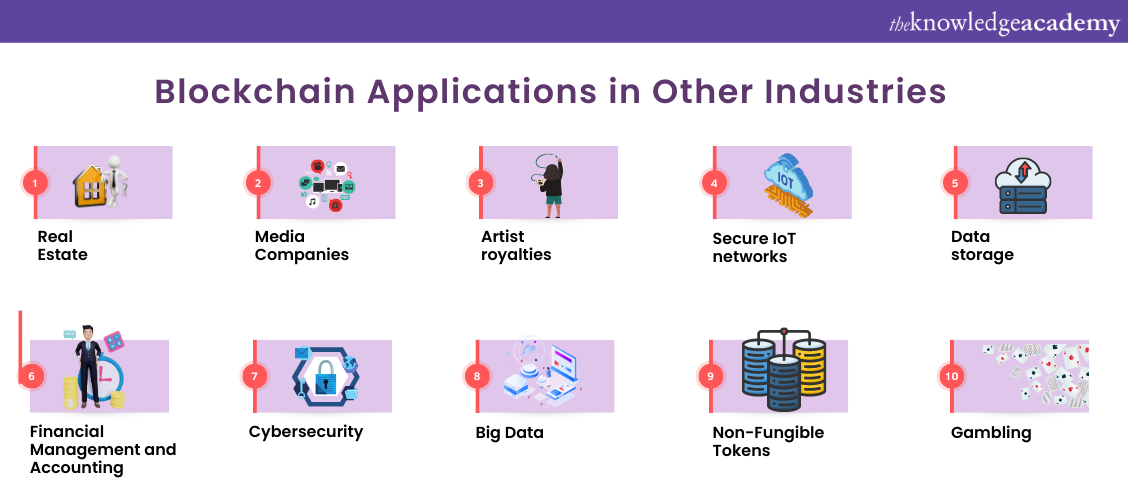
Blockchain usage is not limited to simply Government and Finance. Its immutable records, secure nature and tracing abilities have many applications outside these fields. Let's take some time to understand the applications of Blockchain in other industries.
Real Estate
Blockchain technology comes as a boon to large-scale real estate agencies. The real estate transactions involve verification, ownership details, and other paperwork involving transfer deeds, registrations, and titles to new owners. Applying Blockchain technology in real estate transactions and verification can prove more secure and attainable.
Media Companies
Blockchain technology is utilised by media companies to reduce fraudulent practices and increase the cost optimisation. Blockchain can protect the rights of Intellectual Property alongside tangible assets. Some such properties may be symbols, logos, music records etc.
There are even platforms dedicated to providing Blockchain services for media properties. One such platform “Eluv.io Content Fabric” was launched by Eluvio Inc in 2019. This platform enabled content creators to manage and distribute their work without the requirement of content delivery networks. TheEluv.io turned out to be much faster and cheaper thanks to the usage of a decentralised database.
Artist royalties
Blockchain technology ensures that multiple copies of a single file don’t exist within it, controlling the piracy greatly. Even artists can be paid the money they owe with much greater transparency.
Secure IoT networks
Application of Blockchain technology provides higher security with stronger passwords which stalls the nefarious activities trying to take control of the systems. This helps you in establishing a more robust Internet of Things (IoT).
Data storage
The application of Blockchain technology in the data storage system can provide increased security and integrity. It can also provide better access to data while making it difficult for hackers to wipe out the data since it is decentralised.
Financial Management and Accounting
Financial frauds are a common occurrence in this day and age, however, with the right implementation of Blockchain technology this can be changed. Blockchain’s impenetrable and immutable nature would establish a secure system which would be a tempting choice for people.
Cybersecurity
Blockchain is naturally resistant to unauthorised access due to its end-to-end encryption. This feature makes it a great option for cybersecurity-based implementations. Blockchain will also help cybersecurity to minimise the possibility of Single of Point Failure (SPOF). These failures are generally flaws in a configuration or design which can cease the functioning of the entire system.
Big Data
Blockchain is the perfect tool for storing and tracing the storage history of any data. Big Data’s sheer volume and complexity makes it extremely tough to store and process it by traditional means. Given the large volume of data sets in big data, Blockchain can segregate and arrange them with greater efficiency. This makes Blockchain a plausible improvement on Big Data.
Non-Fungible Tokens
Non-Fungible Tokens (NFTs) are used to digitally represent assets like artwork or any form of real-world tangible assets as well as Intellectual Propertie. Examples include domain names, games, video broadcasting rights, and digital artwork. Using NFT with the Blockchain can ensure that only a single piece of such digital art exists. This is possible because Blockchain makes it impossible for a single data to exist on multiple instances in the same state.
Gambling
By using Blockchain technology in the gambling industry, the transactions are recorded on the Blockchain. It can uplift transparency, and gamblers can feel the games are fair thus, becoming more likely to trust the casino and bet a larger sum. There are even Blockchain casinos dedicated to online gambling. These casinos don’t only benefit from distributed ledgers but are also more accessible to gamblers due to their digital platform.
Conclusion
World of Blockchain is changing rapidly, and world’s attitude towards Blockchain is changing with it. Industries across the globe are confident that Blockchain Applications in different fields will serve them by updating their administrative, security, transparency, and automation processes. The customers believe that data on Blockchain cannot be tampered with easily. Hence, they trust and are loyal to those businesses who have applied Blockchain in their work environments as they are more transparent.
Learn the skills to create and deploy your Private Blockchain. Check out Blockchain Training Course now!
Frequently Asked Questions
Upcoming Programming & DevOps Resources Batches & Dates
Date
 Blockchain Training Course
Blockchain Training Course
Thu 11th Jul 2024
Thu 19th Dec 2024







 Top Rated Course
Top Rated Course



 If you wish to make any changes to your course, please
If you wish to make any changes to your course, please


